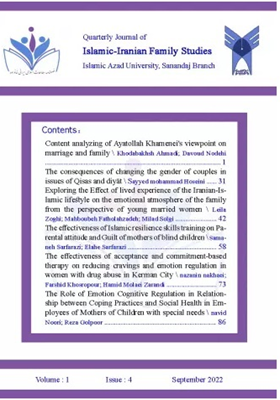The effectiveness of acceptance and commitment-based therapy on reducing cravings and emotion regulation in women with drug abuse in Kerman City
Subject Areas : Islamic-Iranian Family Studies Journalnazanin nakhaei 1 , Farshid Khosropour 2 * , Hamid Molaei Zarandi 3
1 - PhD student in General Psychology, Department of Psychology, Zarand Branch, Islamic Azad University, Zarand, Iran
2 - PhD student in General Psychology, Department of Psychology, Zarand Branch, Islamic Azad University,, Zarand, Iran
3 - Assistant Professor, Department of Psychology,, Zarand Branch, Islamic Azad University. Zarand, Iran
Keywords:
Abstract :
Aim:The aim of this study was to determine the effectiveness of Islamic resilience skills training on parental attitudes and guilt of mothers with blind children. Method: The research method is clinical trial by pretest-posttest method with a control group and the statistical population includes mothers of blind children in 2021. Using purposive sampling method, 32 mothers were selected in cyberspace and randomly selected in two groups of control and Experiments were performed. Attitudes of Parents with Special Needs Child towards Their Children Scale’s Govender (2002) and Guilt Questionnaire’s Eisenhower (2007) were used to collect information. The obtained data were analyzed using multivariate analysis of covariance using SPSS software version 24. Results: Findings showed that there was a significant difference between the performance of control and experimental groups in improving parental attitude and reducing guilt in the post-test stage (p <0.05). Also, the results of covariance analysis showed that Islamic resilience training has improved the subscales of parental attitudes (acceptance and affection, shame, failure, despair and extreme support) in mothers with blind children.Conclusion: Based on the research findings, it can be concluded that educating mothers based on Islamic resilience has had an effect on improving their attitude towards their children and reducing their guilt; Therefore, it can be used as an effective intervention method based on the culture and religion of the community.
_||_

